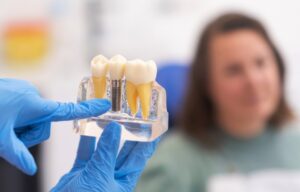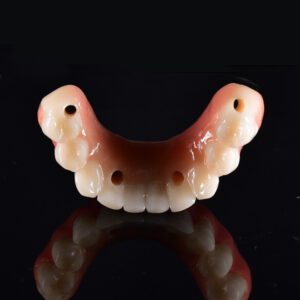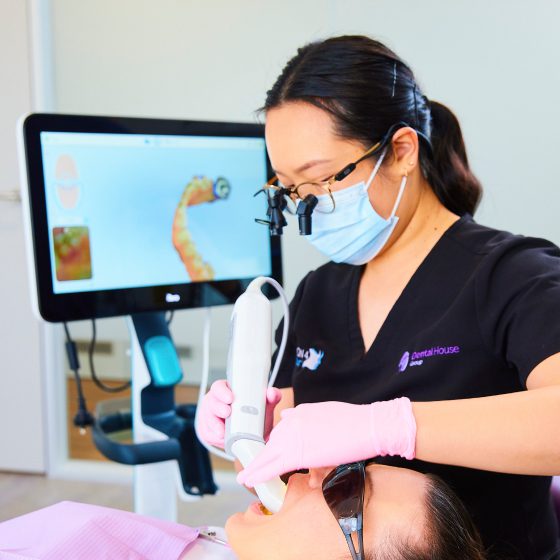If you’re looking for a permanent and natural-looking way to replace missing teeth, dental implants are a great option. Whether you’ve lost teeth due to injury, illness, or aging, these implants can restore your smile’s function and appearance. However, with many types of implants available, choosing the right one can be confusing.
In this guide, we’ll explain the different kinds of dental implants, helping you find the best fit for your oral health needs. From traditional endosteal and subperiosteal implants to innovative All On 4 Plus® and single-tooth implants, you’ll learn about the choices that can transform your smile and improve your quality of life.
What are dental implants?
Dental implants are artificial tooth roots placed into the jawbone to hold replacement teeth. These posts, made of titanium or ceramic, fuse with the bone through a process called osseointegration. Once integrated, they can support a custom-made crown, dental bridge, or denture, creating a natural-looking and functional replacement.
The main advantage of dental implants is their ability to act and look like natural teeth. Unlike traditional dentures or bridges that rely on surrounding teeth for support, implants stand alone, preserving the health of your remaining teeth and jawbone.
Types of Dental Implants

There are several types of dental implants, each designed for different needs:
Endosteal implants
Endosteal implants are the most common type. These metal screws or posts are placed directly into the jawbone and fuse with it over time. They can support a single crown, a bridge, or a full set of replacement teeth. Endosteal implants are ideal if you have a strong, dense jawbone.
Subperiosteal Implants
If your jawbone is too shallow or weak for endosteal implants, subperiosteal implants might be better. These are placed under the gum but on top of the jawbone. They are often used when there has been significant bone loss and do not require as much bone density.
Single-tooth implants
Single-tooth implants replace one missing tooth. A titanium post is placed in the jawbone, and a custom-made crown is attached. This option doesn’t affect surrounding teeth, making it a good choice if you’ve lost a tooth due to injury, disease, or decay.
Implant-supported bridges
If you’re missing multiple teeth, an implant-supported bridge can help. This involves placing two or more implants to support a bridge, filling the gap left by missing teeth. This option avoids modifying healthy teeth and provides a stable foundation for replacement teeth.
All on 4 Plus® Dental Implants

The All On 4 Plus® technique uses four implants to support a full arch of replacement teeth. This method is great if you’ve lost many teeth or have bone loss, as it often doesn’t require bone grafting. The implants are placed at angles to maximize bone use and allow immediate placement of a temporary prosthetic, later replaced with a permanent one.
Same-Day Dental Implants
In some cases, you can get implants and replacement teeth on the same day. The same-day dental implant approach uses special implant designs and techniques for a faster process. It’s useful for single-tooth or full-arch restorations, reducing treatment time and providing a quick transition to a restored smile.
Factors to consider when choosing dental implants
Choosing the right dental implant involves several factors. Your dentist will help you evaluate your needs and preferences:
Jawbone density and volume
The strength and size of your jawbone are crucial. Strong, dense bones are suitable for endosteal implants. If the jawbone is weak, subperiosteal implants or bone grafting might be needed.
Number of missing teeth
The number of missing teeth affects your choice. Single-tooth implants are for individual replacements, while multiple missing teeth might require implant-supported bridges or full-arch solutions.
Overall oral health
Your oral health, including the condition of your teeth, gums, and jawbone, plays a big role. Issues like gum disease or tooth decay might need treatment before implant placement.
Personal preferences and lifestyle
Your lifestyle and preferences matter too. Some people prefer removable dentures, while others want fixed implants for stability and permanence. Your dentist will help tailor the plan to your needs.
Caring for your dental implants
Proper care is essential for long-lasting implants:
Daily oral hygiene
Brush and floss your implants daily. Use a soft-bristled toothbrush and non-abrasive toothpaste. Flossing removes food and bacteria between implants and natural teeth.
Regular dental checkups
Routine checkups and cleanings keep your implants healthy. Your dentist will check the condition of your implants, gums, and bone, and perform any necessary adjustments.
Dietary considerations
Avoid hard, crunchy, or sticky foods that could damage your implants. Be cautious with acidic foods and drinks, as they can erode implant materials. A healthy diet helps extend the life of your implants.
The benefits of dental implants

Dental implants offer many benefits:
- Improved Oral Health: They mimic natural teeth, preserving your jawbone and remaining teeth.
- Exceptional Functionality: Implants provide a stable foundation, allowing natural chewing and biting.
- Enhanced Aesthetics: Custom-made to match your teeth, implants create a natural-looking smile.
- Long-Lasting Solution: With proper care, implants can last for decades, making them cost-effective in the long run.
Are dental implants right for you?
Dental implants offer diverse solutions for restoring your smile and oral health. By understanding the options, you and your dentist can find the best fit for your needs. Whether you need a single tooth replaced or a full-arch restoration, dental implants provide natural-looking, functional, and long-lasting results.
If you have questions about dental implants, call us at 1800 IMPLANT to book an appointment with our specialists. Our friendly team will discuss your needs and guide you through your options.

